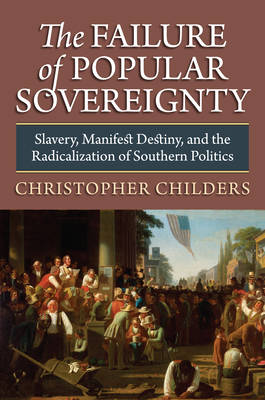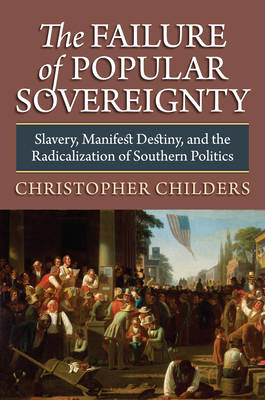
- Retrait gratuit dans votre magasin Club
- 7.000.000 titres dans notre catalogue
- Payer en toute sécurité
- Toujours un magasin près de chez vous
- Retrait gratuit dans votre magasin Club
- 7.000.0000 titres dans notre catalogue
- Payer en toute sécurité
- Toujours un magasin près de chez vous
The Failure of Popular Sovereignty
Slavery, Manifest Destiny, and the Radicalization of Southern Politics
Christopher Childers
44,95 €
+ 89 points
Description
As the expanding United States grappled with the question of how to determine the boundaries of slavery, politicians proposed popular sovereignty as a means of entrusting the issue to citizens of new territories. Christopher Childers now uses popular sovereignty as a lens for viewing the radicalization of southern states' rights politics, demonstrating how this misbegotten offspring of slavery and Manifest Destiny, though intended to assuage passions, instead worsened sectional differences, radicalized southerners, and paved the way for secession. In this first major history of popular sovereignty, Childers explores the triangular relationship among the extension of slavery, southern politics, and territorial governance. He shows how, as politicians from North and South redesigned popular sovereignty to lessen sectional tensions and remove slavery from the national political discourse, the doctrine instead made sectional divisions intractable, placed the territorial issue at the center of national politics, and gave voice to an increasingly radical states' rights interpretation of the federal compact. Childers explains how politicians offered the idea of local control over slavery as a way to appease the South-or at least as a compromise that would not offend the states' rights constitutional scruples of southerners. In the end, that strategy backfired by transforming the South into a rigid sectional bloc dedicated to the protection and perpetuation of slavery--a political time bomb that eventually exploded into Civil War. Tracing the doctrine of popular sovereignty back to its roots in the early American republic, Childers describes the dichotomy between believers in local control in the territories and national control as first embodied in the 1787 Northwest Ordinance. Noting that the slavery extension issue had surfaced before but obviously not been resolved, he shows how the debate over this issue played out over time, complicated the relationship between the federal government and the territories, and radicalized sectional politics. He also provides new insight into such topics as Arkansas and Florida statehood, the early phases of California's statehood bid, and the emergence of John C. Calhoun's common property doctrine. Laced with new insights, Childers's study offers a coherent narrative of the formative moments in the slavery debate that have been seen heretofore as discrete events. His work stands at the intersection of political, intellectual, and constitutional history, unfolding the formative moments in the slavery debate to expand our understanding of the peculiar institution in the early republic.
Spécifications
Parties prenantes
- Auteur(s) :
- Editeur:
Contenu
- Nombre de pages :
- 348
- Langue:
- Anglais
- Collection :
Caractéristiques
- EAN:
- 9780700618682
- Date de parution :
- 08-11-12
- Format:
- Livre relié
- Format numérique:
- Genaaid
- Dimensions :
- 150 mm x 231 mm
- Poids :
- 657 g

Les avis
Nous publions uniquement les avis qui respectent les conditions requises. Consultez nos conditions pour les avis.






